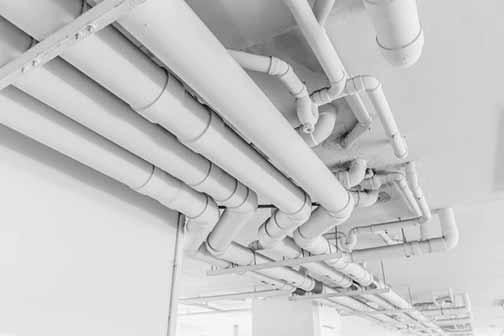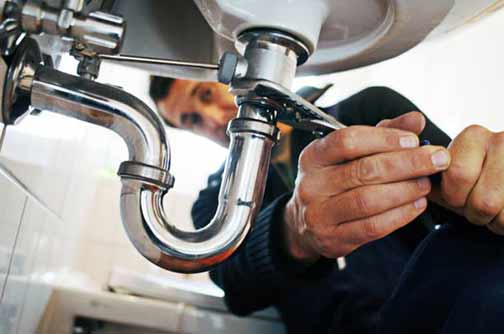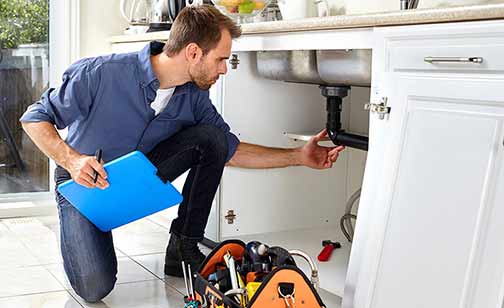
Understanding the plumbing system in your condo is essential for several reasons. It not only helps you maintain your unit but also contributes to the overall well-being of the entire building. Plumbing systems in condominiums are complex networks that ensure the efficient delivery of water and the removal of waste. Below we get into the key components and workings of these systems, providing residents with a comprehensive understanding of how everything connects from their unit to the entire building.
Key Components of a Condo Plumbing System
A condominium plumbing system consists of several crucial components that work together seamlessly. These components include water supply lines, drainage systems, fixtures, and more. Each component plays a vital role in ensuring the smooth operation of the plumbing system.
Water Supply Lines: The Lifeline of Your Condo
Water supply lines are responsible for delivering clean water to each unit. These lines are typically made of copper, PEX, or PVC and are designed to withstand high pressure. The main water supply line connects to the municipal water system, and from there, it branches out to individual units. Understanding the layout of these lines can help you identify potential issues and address them promptly. Regular checks can prevent leaks and ensure a steady flow of water, which is crucial for daily activities.
Drainage Systems: Efficient Wastewater Removal
The drainage system is responsible for removing wastewater from your condo. It includes pipes and vents that ensure the proper flow of waste to the municipal sewer system. The drainage system is a gravity-based system, meaning that it relies on the natural slope of the pipes to carry waste away. Regular maintenance of the drainage system is crucial to prevent blockages and backups. Ensuring that the vents are clear is also important as they allow air to enter the system, preventing vacuum formation and ensuring smooth waste flow.
Plumbing Fixtures: Everyday Interactions
Plumbing fixtures are the visible parts of the system that you interact with daily, such as faucets, sinks, toilets, and showers. These fixtures are connected to both the water supply and drainage systems. Proper care and maintenance of these fixtures are essential to prevent leaks and other issues that could affect the entire plumbing system. Regularly checking for drips and ensuring that seals and connections are intact can save water and prevent damage to your unit.

How Condo Plumbing Systems Work
The plumbing system in a condo operates as a cohesive unit, with each component playing a specific role. Water enters the building through the main supply line and is distributed to individual units. Wastewater is then collected and directed to the municipal sewer system through the drainage system. This process is continuous and requires all components to function correctly to avoid disruptions.
Water Distribution: Ensuring Consistent Flow
Water distribution in a condo involves a network of pipes that deliver water to each unit. The water pressure is regulated to ensure consistent flow to all units, regardless of their location within the building. This system includes shut-off valves that allow for maintenance and repair without disrupting the entire building’s water supply. Understanding how to operate these valves can be vital in an emergency, allowing you to isolate issues without affecting neighbors.
Wastewater Management: Keeping It Flowing
Wastewater management is a critical aspect of the plumbing system. The drainage system collects wastewater from each unit and directs it to the main sewer line. Proper venting is essential to maintain air pressure within the pipes, preventing sewer gases from entering living spaces. Regular inspections and maintenance of the drainage system can help prevent clogs and other issues. Being aware of what can and cannot be flushed or disposed of in sinks can also prevent common problems.
Common Plumbing Issues in Condos
Residents of condominiums may encounter various plumbing issues, some of which are unique to multi-unit buildings. Understanding these common problems can help you address them effectively and minimize their impact on your living environment.
Leaks and Drips: Addressing Water Wastage
Leaks and drips are common plumbing issues that can occur in any part of the system. They can result from worn-out fixtures, damaged pipes, or faulty connections. Addressing leaks promptly is essential to prevent water damage and costly repairs. Regularly inspecting under sinks and around fixtures for signs of moisture can help catch issues early.
Clogged Drains: Keeping Things Moving
Clogged drains are another frequent issue in condos. They can occur due to the buildup of debris, grease, or foreign objects in the pipes. Regular cleaning and maintenance can help prevent clogs and ensure the smooth flow of wastewater. Using strainers in sinks and showers can catch hair and debris, reducing the risk of clogs.
Low Water Pressure: Ensuring Efficiency
Low water pressure can be a frustrating issue for condo residents. It can result from various factors, including pipe blockages, leaks, or problems with the municipal water supply. Identifying the root cause of low water pressure is crucial for finding an effective solution. Sometimes, the issue may be with a specific fixture, while other times it could be a building-wide problem.

Maintaining Your Condo’s Plumbing System
Proper maintenance of your condo’s plumbing system is essential to ensure its longevity and efficiency. Regular inspections, cleaning, and repairs can help prevent common issues and keep the system running smoothly.
Regular Inspections: Proactive Problem-Solving
Conducting regular inspections of your plumbing system can help identify potential problems before they escalate. Check for signs of leaks, corrosion, or damage to pipes and fixtures. Addressing these issues early can save you time and money in the long run. Keeping a log of inspections and any repairs can also be helpful for future reference.
Routine Cleaning: Preventive Measures
Routine cleaning of drains and fixtures can prevent clogs and buildup. Use appropriate cleaning products and techniques to maintain the integrity of the plumbing system. Avoid using harsh chemicals that could damage pipes or fixtures. Natural solutions, such as baking soda and vinegar, can be effective and safe for cleaning drains.
Professional Maintenance: Expert Assistance
Engaging professional plumbers for regular maintenance is a wise investment. They can perform thorough inspections, identify hidden leaks, and provide expert solutions. Professional maintenance can extend the life of your plumbing system and enhance its performance. Scheduling annual or bi-annual checks can catch problems before they become serious.
Conclusion: The Importance of Understanding Your Condo’s Plumbing System
Understanding the plumbing system in your condo is crucial for maintaining a comfortable and functional living environment. By familiarizing yourself with the key components and workings of the system, you can identify and address issues promptly. Regular maintenance and professional assistance from a local plumber can further ensure the longevity and efficiency of your condo’s plumbing system. Taking these steps not only benefits your unit but also contributes to the overall well-being of the entire building. By being proactive, you can prevent minor issues from becoming major problems, ensuring a safe and pleasant living space for all residents.

